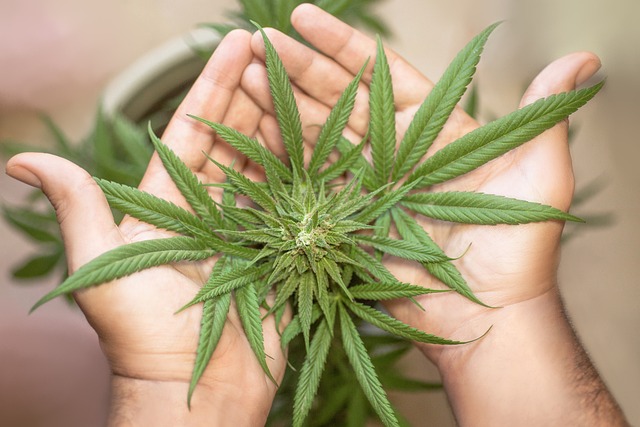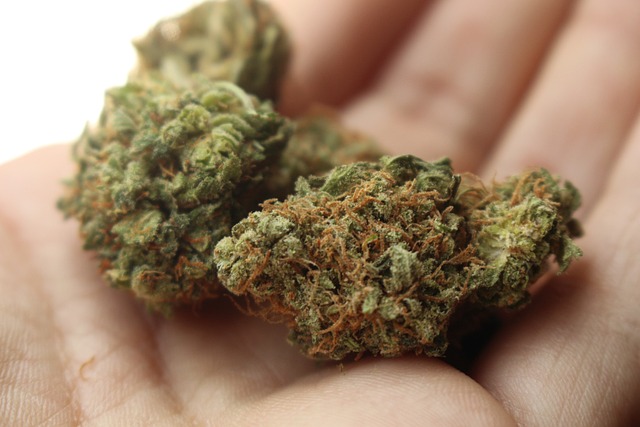THCA (tetrahydrocannabinolic acid), a non-psychoactive cannabinoid, is legally available in Arizona as THCA flower under the guidelines set forth by the 2018 Farm Bill, which legalized hemp and its derivatives with less than 0.3% THC by dry weight. In Arizona, THCA can be used for both medical and recreational purposes, but consumers must stay informed about local regulations as they may vary by municipality. While THCA itself doesn't cause psychoactive effects, it can convert to THC post-consumption, leading to mild intoxication. Common side effects include dry mouth and dry eyes, with other potential effects like dizziness or mild anxiety that can be mitigated through dosage and consumption method adjustments. It's crucial for individuals to consult healthcare professionals if they have concerns about interactions with other medications. Arizona's regulations include age restrictions and the requirement that THCA flower be purchased from licensed dispensaries. Safe storage and clear product labeling are essential to prevent unintended use by children and pets. As the legal landscape and understanding of THCA's effects evolve, users are encouraged to stay well-informed on both its potential health benefits and the current regulations in Arizona.
Exploring the emergent landscape of cannabinoids, this article sheds light on THCA flower, a non-psychoactive compound gaining attention for its therapeutic potential. As THCA flower becomes legally recognized in Arizona, understanding its effects and safe consumption practices is paramount. We delve into the side effects associated with its use, ensuring readers are well-informed about this burgeoning area within the state’s evolving legal framework. Join us as we navigate the nuances of THCA flower’s impact on health and safety.
- Understanding THCA Flower: Legality and Potential Impact in Arizona
- Exploring the Side Effects of THCA Flower Consumption
- Navigating THCA Flower Safety: Dosage, Interactions, and Precautions in Arizona's Legal Framework
Understanding THCA Flower: Legality and Potential Impact in Arizona

Understanding THCA Flower’s emergence as a subject of interest within the context of Arizona’s evolving cannabis landscape is crucial for both consumers and legal authorities. THCA, or Tetrahydrocannabinolic Acid, is the raw form of THC (tetrahydrocannabinol), which becomes psychoactive when heated. As of the knowledge cutoff in 2023, THCA flower’s legality in Arizona hinges on the 2018 Farm Bill and subsequent state legislation. This federal legislation legalized hemp and its derivatives, provided they contain less than 0.3% THC by dry weight. Consequently, products derived from hemp, including THCA flower that meets this threshold, are legally permissible in Arizona. However, it’s imperative to navigate these products with caution, as the landscape of cannabis laws is subject to change and may differ when considering state versus federal regulations. Users should always verify the legality of THCA flower in their specific location within the state, as local ordinances may impose additional restrictions. The potential impact of THCA flower in Arizona is multifaceted, touching upon medical applications, recreational use, and the broader economic implications associated with a new market of cannabis-derived products. Consumers interested in exploring the benefits of THCA flower should approach it responsibly, staying informed about both the therapeutic properties attributed to this compound and the legal framework governing its use.
Exploring the Side Effects of THCA Flower Consumption

THCA, or Tetrahydrocannabinolic Acid, is a non-psychoactive cannabinoid found in the Cannabis sativa plant and is considered the precursor to THC, the primary psychoactive component of cannabis. As interest in cannabis derivatives grows, so does the exploration into the potential effects of THCA. In Arizona, where THCA flower has been legalized for recreational and medicinal use under specific conditions, it’s crucial for consumers to understand its side effects. While THCA itself is non-psychoactive, its conversion to THC post-consumption can lead to a range of experiences. Users may notice mild psychoactive effects as the THCA breaks down in their bodies. Common side effects reported include dry mouth and dry eyes, often associated with cannabis consumption. These conditions are typically temporary and can be alleviated by staying hydrated. Additionally, some individuals may experience dizziness or mild anxiety, which can generally be mitigated by adjusting dosage and consumption methods. It’s important for users to start with low doses to gauge their individual response and to consult with healthcare professionals if they have concerns about potential interactions with other medications. As research continues to evolve, so does the understanding of THCA’s side effects, particularly in the context of Arizona’s regulatory framework, which aims to ensure safe and informed use within its legal boundaries. Users should always refer to the latest guidance from authoritative sources and follow local laws when considering THCA flower consumption.
Navigating THCA Flower Safety: Dosage, Interactions, and Precautions in Arizona's Legal Framework

Navigating THCA flower safety begins with understanding its legal status in Arizona, where it is permissible under state law. In Arizona, THCA, or tetrahydrocannabinolic acid, a non-psychoactive cannabinoid found in raw cannabis plants, is legal provided it adheres to the state’s regulations. Consumers looking to explore the potential benefits of THCA must be cognizant of proper dosage and potential interactions with other substances or medications. Dosage can vary widely based on individual body chemistry, tolerance, and desired effects, making a ‘start low and go slow’ approach advisable. It is crucial to consult with a healthcare provider when integrating THCA flower into one’s wellness regimen, especially if taking other medications, as interactions are possible, though extensive research on the subject is ongoing due to the relatively recent legalization of cannabis products in many states.
Arizona’s legal framework for THCA flower necessitates strict adherence to state guidelines, which include age restrictions and licensed dispensary sales. Users should be aware that while THCA itself is non-psychoactive, it can convert into THC (tetrahydrocannabinol) when exposed to heat or when ingested, leading to psychoactive effects. Precautions such as secure storage away from children and pets, and clear labeling of products are essential for safety. Arizona’s legal landscape for cannabis is continually evolving, with updates to laws and regulations that users must stay informed about. Engaging with reputable sources and local authorities ensures the most current information on THCA flower use and safety within the state.
In wrapping up our exploration of THCA flower, it’s evident that while this cannabinoid shows promise for various therapeutic applications and is legally permissible in Arizona under certain conditions, careful consideration of its side effects and safety profile is paramount. Users must approach THCA consumption with an understanding of its potential impact, including the side effects detailed in our discussion. As THCA continues to gain traction within Arizona’s legal landscape, it’s crucial for both consumers and healthcare professionals to stay informed on its dosage recommendations, interaction considerations, and safety guidelines. By doing so, individuals can make informed decisions that align with their health goals while responsibly enjoying the benefits of THCA flower in Arizona’s regulated market.
